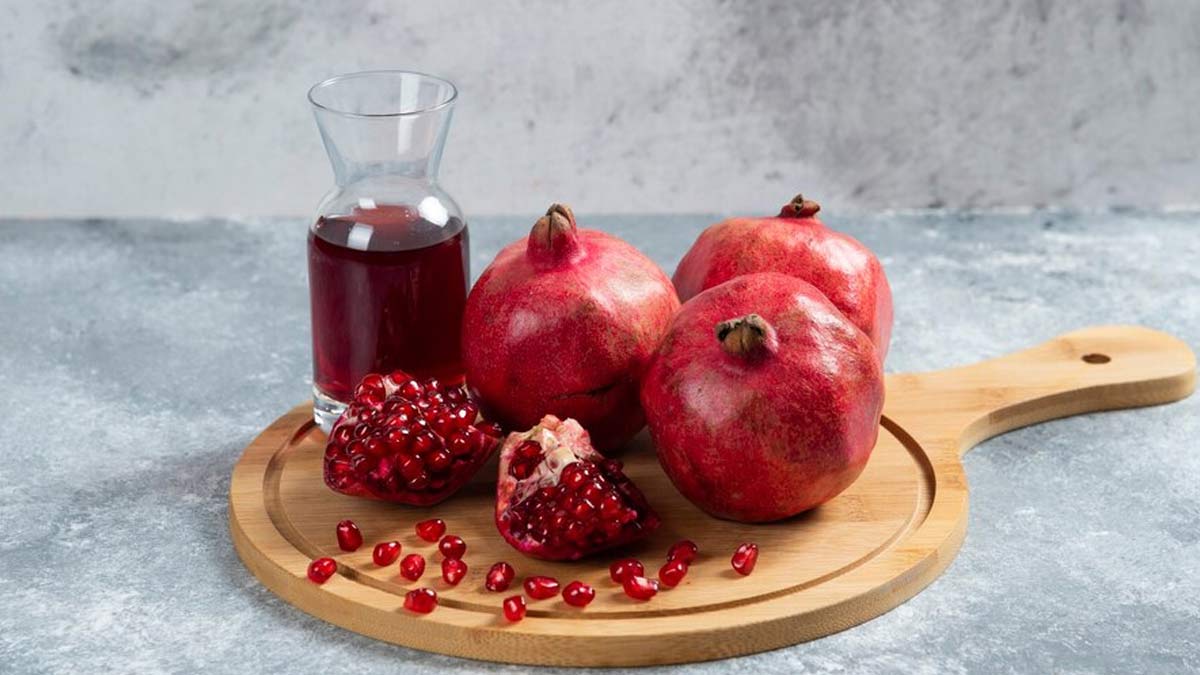
Pomegranates are considered one of the most nutritious fruits along with being equally delicious. They are packed with antioxidants, including ellagitannins, anthocyanins, and organic acids, which protect cells from oxidative damage. To fully take advantage of their benefits and avoid any potential risks, there are a few important points to keep in mind. We spoke to our expert Dr Archana Batra, Dietician and Certified Diabetes Educator, who listed seven things that you should avoid when eating pomegranates.
Table of Content:-
Things to Avoid When Eating a Pomegranate

1. Ignoring the Factor of Mess
You should avoid underestimating the potential mess. Pomegranates are known for being untidy because their juicy seeds, or arils, frequently spill and discolour everything they come into contact with. Dr Batra said, “When preparing the fruit, use a big basin or a sink and wear old clothes or an apron. Chopping the fruit in water is a good way to reduce splatter. While chopping, submerging the pomegranate in a basin of water helps contain the fluids and facilitates the process of removing the seeds from the rind.”
2. Eating the Rind
“The rind of pomegranates is not suited for consumption, despite the tasty and healthy seeds inside. Its stiff, thick outer skin is nasty and bitter,” added Dr Batra. Therefore, concentrate on removing and savouring the juicy, tart-sweet arils within. The simplest method for doing this is to score the rind and then crack open the pomegranate to get at the seeds without eating the rind.
Also Read: From Weight Loss To Good Skin: Here Are 8 Benefits Of Pomegranate Juice

3. Overindulging
You should avoid eating too many arils at once. Dr Batra said, “Pomegranates are packed with fibre, which is beneficial for digestion, but consuming too many arils can lead to digestive issues, such as upset stomach or diarrhoea.”
Moderation is Key. A serving size of about half a cup of arils is sufficient to enjoy the fruit’s health benefits without overdoing it. This way, you can savour the fruit while maintaining digestive comfort.
4. Forgetting About Allergies
Pomegranate allergies are uncommon, however they can occur in some persons. An allergic reaction may cause swelling, itching, and breathing difficulties. It’s critical to stop eating pomegranates right away and get medical help if you encounter any of these symptoms. It is possible to avoid major health problems and guarantee a safe eating experience by being aware of potential sensitivities.

5. Discarding the Whole Fruit Too Quickly
Avoid throwing away the whole fruit if the outer skin looks blemished. Pomegranates occasionally have discoloured or blemished skins, although this doesn’t always indicate the seeds within are poor quality. “The thick skins of pomegranates shield the seeds within. If the fruit looks broken, be sure the inside is still delicious and the arils are still Intact before throwing it away. Often, the seeds are flawless even while the outer layer isn’t,” highlighted Dr Batra.
Also Read: Lesser Known Health Benefits Of Pomegranate Seeds
6. Eating Unripe Pomegranates
A pomegranate that isn’t ripe can be quite tart and less tasty. To determine if a pomegranate is ripe, choose one that feels heavy for its size and has a rich, vibrant colour. Although firm, the skin should give somewhat when applying pressure. The greatest flavour and sweetness come from a ripe pomegranate, which enhances the pleasure of eating.
7. Ignoring the Nutritional Benefits
Don't miss out on the health benefits of pomegranates by not including them in your diet regularly. Pomegranates are rich in antioxidants, vitamins, and minerals, and offer several health advantages, such as lower blood pressure, reduced inflammation, and potential cancer prevention.
Hence, make sure to include pomegranates in your diet regularly to fully experience these benefits. The seeds are edible, and the juice can be consumed or added to various dishes, such as smoothies, salads, and desserts. Regular consumption of pomegranates can significantly improve your health in various ways.
A study involving individuals with heart disease revealed that drinking pomegranate juice reduced the frequency and severity of chest pain while also decreasing specific biomarkers, suggesting a protective impact on heart health.
Bottomline
Dr Batra concluded, “Pomegranates are a nutritious and delicious powerhouse that you can include in your diet for a host of health benefits. However, you need to avoid common mistakes, such as overindulging, underestimating the mess, and eating the inedible parts to properly enjoy and reap the benefits of this fruit. By using, storing, and handling pomegranates correctly, you can enhance your experience and maximise the health benefits of this superfruit.”
[Disclaimer: This article contains information provided by an expert and is for informational purposes only. Hence, we advise you to consult your own professional before making any dietary changes, especially if you are dealing with any health issues to avoid complications.]
Also watch this video
How we keep this article up to date:
We work with experts and keep a close eye on the latest in health and wellness. Whenever there is a new research or helpful information, we update our articles with accurate and useful advice.
Current Version
